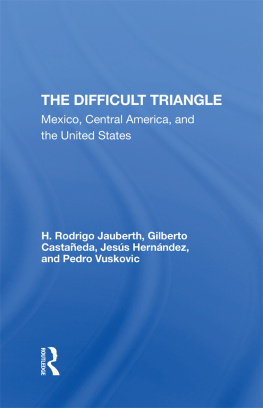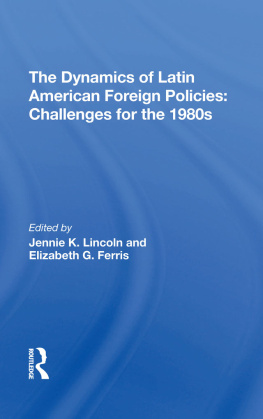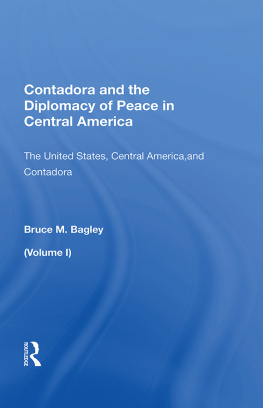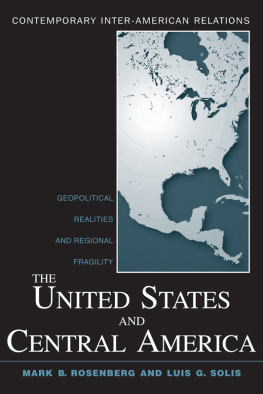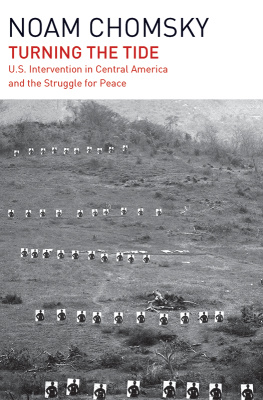THE DIFFICULT TRIANGLE
Other PACCA Books from Westview Press
From Confrontation to Negotiation: U.S. Relations with Cuba, Philip Brenner
The Dangerous Doctrine: National Security and U.S. Foreign Policy, Saul Landau
Crisis in Central America: Regional Dynamics and U, S. Policy in the 1980s, edited by Nora Hamilton, Jeffry A. Frieden, Linda Fuller, and Manuel Pastor, Jr.
In the Shadows of the Sun: Caribbean Development Alternatives and U.S. Policy, Carmen Diana Deere (coordinator), Peggy Antrobus, Lynn Bolles, Edwin Melendez, Peter Phillips, Marcia Rivera, Helen Safa
This book is a project of Policy Alternatives for the Caribbean and Central America (PACCA) in cooperation with Centro de Investigacin y Docencia Econmicas (CIDE)
Coordinadora Regional de Investigaciones Econmicas y Sociales (CRIES)
The Difficult Triangle
Mexico, Central America, and the United States
H. Rodrigo Jauberth, Gilberto Castaeda, Jess Hernndez, and Pedro Vuskovic
Translators Note: This volume cites many English-language sources, the majority of which are filtered through Spanish-language media. Quotations from such sources are therefore an approximation of the original, faithful to the spiritbut not the letter.
First published 1992 by Westview Press
Published 2019 by Routledge
52 Vanderbilt Avenue, New York, NY 10017
2 Park Square, Milton Park, Abingdon, Oxon OX14 4RN
Routledge is an imprint of the Taylor & Francis Group, an informa business
Copyright 1992 by Policy Alternatives for the Caribbean and Central America
All rights reserved. No part of this book may be reprinted or reproduced or utilised in any form or by any electronic, mechanical, or other means, now known or hereafter invented, including photocopying and recording, or in any information storage or retrieval system, without permission in writing from the publishers.
Notice:
Product or corporate names may be trademarks or registered trademarks, and are used only for identification and explanation without intent to infringe.
Library of Congress Cataloging-in-Publication Data
Triangulacin Centroamrica-Mxico-EUA. English.
The difficult triangle: Mexico, Central America, and the United
States / H. Rodrigo Jauberth... [et al.]
p. cm.
Translation of: La triangulacin Centroamrica-Mxico-EUA.
A PACCA book.
Includes index.
ISBN 0-8133-8203-3. ISBN 0-8133-8204-1 (pbk.).
1. United StatesForeign relationsMexico. 2. MexicoForeign
relationsUnited States. 3. Central AmericaForeign relations
United States. 4. United StatesForeign relationsCentral
America. 5. Central AmericaForeign relationsMexico. 6. Mexico
Foreign relationsCentral America. I. Jauberth, H. Rodrigo.
II. Title.
E183.8.M6T6513 1992
327.73072dc20 91-38079
CIP
ISBN 13: 978-0-367-29128-0 (hbk)
Contents
, Xabier Gorostiaga
, H. Rodrigo Jauberth
, Jess Hernndez
, H. Rodrigo Jauberth
, Pedro Vuskovic
, Gilberto Castaeda
, Gilberto Castaeda, H. Rodrigo Jauberth, Pedro Vuskovic, and Jess Hernndez
This prologue contributes a Central American perspective to this important book, complementing the commentaries from Mexico and the United States contained in the Epilogue. We thus hope to reinforce the triangular analysis of political and economic relations among Mexico, Central America, and the United States undertaken by CIDE, PACCA, and CRIES.
This is a time of rapid change in the region. As manifested in recent initiatives, Washington clearly has a policy to reshape regional ties. Examples are the planned Free Trade Agreement with Mexico, President Bush's "Enterprise for the Americas" initiative toward Latin America, and continuing U.S. efforts to reshape Central American economies, now under the aegis of the "Program for Democracy and Development."
From a Central American perspective these changes, and the attitude Mexico has recently shown toward Central America on the political-diplomatic level, raise the prospect of fundamental alterations in the triangular relationship. Is Mexico being pulled away from its traditional role of standing with other Latin American countries when they confronted the United States? Will its economic relations with Central America be determined by its trade pact with the United States?
These dilemmas and changes require a Latin American response, an agenda for reshaping hemispheric relations based on a regional perspective, rather than bilateral relations or a simple acquiescence in the Bush administration's plans. There are significant opportunities to be grasped, particularly in the end of the cold war and the global tensions and local polarizations produced by the East-West conflict. We must also broaden the range of actors who participate in and shape these hemispheric relations, especially including previously disenfranchised social sectors that have emerged and found voices in recent years.
The growing formal democratization in Central America is to be welcomed, even considering the high rates of voter abstention and continuing violations of human rights in El Salvador and Guatemala. But the apparent political homogenization is artificial, reducing the opportunities for participating in power and attenuating political pluralism. The possibility of extending and deepening democracy into broader spheres of civil society has become more remote.
In the Epilogue, Primitivo Rodriguez and David Brooks point out efforts by U.S. and Mexican trade unions to play a role in determining the shape of the Free Trade Agreement. It is not just that unions and other affected social sectors should play, for democratic reasons, a role in determining their own countries' policies. Given the transnationalization of capital, labor movements must also reach across borders and cooperate, or be placed at a serious disadvantage.
The argument of this book, that a multilateral relationship allows the weaker parties greater opportunity to exercise sovereignty than do bilateral relations that maximize the advantage of the most powerful country, applies to economic relations just as to political-diplomatic ties. If rather than forging closer trade links among themselves and making economic policy that responds to local needs, Latin American countries synchronize policies according to the formulas advocated by Washington, the asymmetries of wealth and economic power will put each country at a disadvantage with respect to the United States. Latin nations will end up competing on the basis of low wages and lax regulationthe comparative advantage of miserywhile much of their already-poor populations becomes beggars and delinquents. The results will be increasing social polarization, violence, drug trafficking, and migration.
Diversified economic relations are also less risky. If Latin American countries trade extensively with Europe, Asia, and Africa as well as the United States, they will be less vulnerable to a U.S. recession. This applies especially to the small Central American economies. Nor is the U.S. economy helped if a domestic recession produces crisis in Latin America and weakens demand for U.S. exports.
The regulatory roles played by the International Monetary Fund (IMF), World Bank, and, increasingly, the Inter-American Development Bank must be redefined around goals of fair trade and equitable competition and sustainable and renewable growth, all of which are to be found in their charters but which have been subordinated to their present roles of inspector and keeper of monopolistic and asymmetrical market power for the wealthier countries. The protectionism practiced by the Group of Seven (G7) is not subject to this inspection, nor is the United States forced into "structural adjustment" on account of its gigantic foreign debt and fiscal deficit. The democratization of these multilateral bodies, now controlled by the G7 countries, is a fundamental item on the new agenda.

